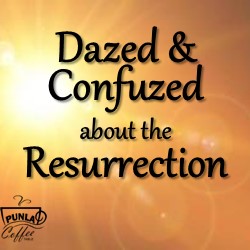(Transcript from Dr. Kip Wehrman 02/11/2024)
Dawkins also describes his version of reality in another book titled River Out of Eden: Darwin’s Life View.
He says, “In a universe of electrons and selfish genes, blind physical forces and genetic replication, some people are going to get hurt, other people are going to get lucky, and you won’t find any rhyme or reason in it, nor any justice. The universe that we observe has precisely the properties we should expect if there is, at bottom, no design, no purpose, no evil, no good, nothing but pitiless indifference.”
Probably one of Dawkins more famous quotes is also from this same book. He says, “DNA neither cares nor knows. DNA just is. And we dance to its music.”
So, Dawkins claims there is no evil, no good just pitiless indifference and we dance to the music of our DNA.
So how did Dawkins say this about God, remember his quote from the God Delusion book, his version of god is unpleasant. God is jealous, petty, unjust, misogynistic, homophobic, racist, bully. I have to admit I hear this term misogynistic all the time. I finely had to look it up. For those of you, like me that don’t know. It means hatred of women.
But despite the words that Dawkins is using. What is his basis for these moral arguments. Richard didn’t you tell us there is no good or bad.
Richard says God is petty and unjust. Richard, where did you get your idea about just or unjust?
And you can see his list of complaints which do not sound like indifference. Even Richard Dawkins believes in God whether he says so or not. He uses God to make all his arguments because without God there is no reason for Richard Dawkins to speak or write his books. No purpose, just pitiless indifference, nothing. Of course, we know there is a God and in fact Dawkins makes my case for me.
So evil proves God exists, not the other way around. That might seem odd to hear. But if God does not exist, then there is no basis for judging things bad or good. Only opinion.
Okay, What about the purpose of evil? Okay, I warned you this would be a hard conversation and I’m not a pastor or counselor.
But can we imagine a purpose of evil?
Or it is better to say it this way, Why is there evil?
We need a working definition for evil.
The simplest definition is, “Evil is the absence of goodness.” Evil is an imperfection in God’s creation. If you removed all the goodness from the world, evil would not exist. Here are a couple examples.
Frank Turek likes to use this example. It is like this rusty car.
If I remove all the rust from my car,
I have a nicer car.
If I remove all the car from the rust, then you have nothing. No car. Nothing. The rust needs the metal of the car to exist.
What about a shadow. If you take away the light, what happens to the shadow?
it doesn’t exist. A shadow cannot exist without light.

How about sunshine. I love sunny beautiful days. What happens to the sunshine if the sun goes away?
You got it. No more sunshine. Sunshine cannot exist without the sun.
What about this one. Cold. Scientifically speaking cold is not a thing. Now I know some of you know what cold feels like. I’ve been on the north slope of Alaska in February. -50 degrees, whiteout conditions. I mean to tell you that is cold. I have been in Finland in January it’s cold. And I grew up in Nebraska and I’ve had my eyelashes freeze together so I can’t open your eyes. So, Cold. It’s not a thing. Sorry. Cold is just the absence of heat. Cold is a byproduct of the lack of heat. You don’t really make something cold; you actually remove the heat from an item so we call it cold. Cold is just less hot. Without heat there could be no cold.
We must identify and define evil. Terrorism, war, famine, disease. These are bad things. But are they evil?
There are two commonly accepted types of evil. These are moral evil and natural. Moral evil is created by mankind. It is wickedness against our fellow humans. It includes war, murder, rape, terrorisms, jealousy, envy, suicide and others. Natural evil consists of the consequences that are derived from the operations of our world’s impersonal natural forces such as earthquakes, floods, hurricanes, epidemics and others.
So evil or bad? No one will argue there is no suffering in our world. Everyone has experienced and seen things they perceive as “bad” or evil. Not all bad things are evil. Bad is subjective in most cases. What is bad for me might be good for someone else. These types of events are not evil, but the product of human decisions. Good or bad becomes an issue of perspective. Sometimes the intentions of those people are without a doubt evil. So we will come back to this one.
What about natural evil. These are things like earthquakes, typhoons, floods, lightning, extreme cold or hot, draughts etc. Of course, the aftermath of such natural disasters seems to all to be bad. There is suffering and death and devastation. The question is why do we think this is evil? If we understand, a worldwide picture based on naturalism, then why would this be bad?
This is just the planet’s mechanisms working according to natural laws. I find blaming “God” for this absurd. If the naturalist perceives this to be bad, then what is their basis. Using such natural disasters in an attempt to disprove God, requires the naturalist to form a basis for calling it bad. Since naturalism cannot define anything as “bad,” the result is there must be a God to define these events as “bad.”
Natural events are just that part of nature. If I walk up to a lion and pull its tail, what do you think will happen. When it injures or kills me, it is bad for me, but the lion is not evil. Weather and other natural events is how our world works. We don’t blame the science that tries to predict the weather for the outcomes. So, no natural “evil” is not really evil at all. It’s just natural. Bad for you if you are in its way but if you get out of the way, then maybe less bad.
This is the end of How to Defend your Faith Session 6: the Problem of Evil (Part 2 of 4)


